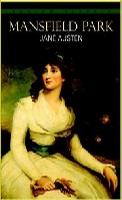-

Mansfield Park
In Mansfield Park, first published in 1814, when the author had reached her full maturity as a novelist, Jane Austen paints some of most witty and perceptive studies of character. Against a genteel country landscape of formal parks and stately homes, the gossipy Mrs Norris becomes a masterful comic creation; the fickle young suitor Henry Crawford provides an unequaled portrait of an unscruplous young man; and the complexy drawn Fanny Price emerges as one of Jane Austen's finest achievements--the poor cousin who comes to stay with her wealthy relatives at Mansfield Park and learns how the game of love can too easily turn to folly. More intricately plotted and wider in scope than Austen's earlier works, Mansfield Park continues to enchant and delight us as a superb example of a great author's craft. -

Mansfield Park
Begun in 1811 at the height of Jane Austen's writing powers and published in 1814, "Mansfield Park" marks a conscious break from the tone of her first three novels, "Northanger Abbey", "Sense and Sensibility", and "Pride and Prejudice", the last of which Austen came to see as 'rather too light.' Fanny Price is unlike any of Austen's previous heroines, a girl from a poor family brought up in a splendid country house and possessed of a vast reserve of moral fortitude and imperturbability. She is very different from Elizabeth Bennet, but is the product of the same inspired imagination. -

Emma (Penguin Popular Classics)
Emma Wodehouse has led a simple life, but during the course of this she at last reaps her share of the world's vexations. In this comedy of manners, the heroine learns to come to terms with the reality of other people, and with her own erring nature. Jane Austen was born in Steventon, Hampshire, on December 16, 1775. Her father, the Reverend George Austen, was rector of Steventon, where she spent her first twenty-five years, along with her six brothers (two of them later naval officers in the Napoleonic wars) and her adored sister, Cassandra. She read voraciously from an early age, counting among her favorites the novels of Samuel Richardson, Henry Fielding, and Fanny Burney, and the poetry of William Cowper and George Crabbe. Her family was lively and affectionate and they encouraged her precocious literary efforts, the earliest dating from age twelve, which already displayed the beginnings of her comic style. Her first novels, Elinor and Marianne (1796) and First Impressions (1797), were not published. The gothic parody Northanger Abbey was accepted for publication in 1803 but was ultimately withheld by the publisher. -

Persuasion
Persuation is the last work of one of the greatest of novelists, the end of a quiet career pursued in anonymity in rural England that produced novels which continue to give pleasure to millions of readers throughout the world. -

SENSE AND SENSIBILITY
Marianne Dashwood wears her heart on her sleeve, and when she falls in love with the dashing but unsuitable John Willougby, she ignores her sister Elinor's warning that her impulsive behaviour leaves her open to gossip and innuendo. Meanwhile Elinor, always sensitive to social convention, is struggling to conceal her own romantic disappointment, even from those closest to her. Through their parallel experience of love - and its threatened loss - the sisters learn that sense must mix with sensibility if they are to find personal happiness in a society where status and money govern the rules of love. -

Persuasion
Jane Austen’s last completed novel, Persuasion is a delightful social satire of England’s landed gentry and a moving tale of lovers separated by class distinctions. After years apart, unmarried Anne Elliot, the heroine Jane Austen called “almost too good for me,” encounters the dashing naval officer others persuaded her to reject, as he now courts the rash and younger Louisa Musgrove. Superbly drawn, these characters and those of Anne’s prideful father, Sir Walter, the scheming Mrs. Clay, and the duplicitous William Elliot, heir to Kellynch Hall, become luminously alive—so much so that the poet Tennyson, visiting historic Lyme Regis, where a pivotal scene occurs, exclaimed: “Don’t talk to me of the Duke of Monmouth. Show me the exact spot where Louisa Musgrove fell!” Tender, almost grave, Persuasion offers a glimpse into Jane Austen’s own heart while it magnificently displays the full maturity of her literary power.